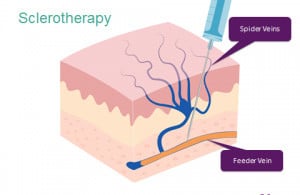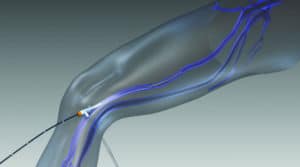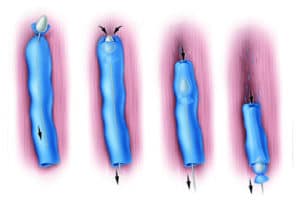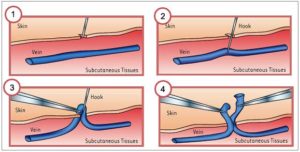What Causes Varicose Veins in Men?
Varicose veins are large, swollen, and twisted veins, mostly appearing on the legs and feet. They occur due to defective valves in the veins, which cause the blood to flow in the wrong direction and pool in your legs. At Precision VIR, we see varicose veins in men and women.
Although women more often report varicose veins than men, the latter gender may also develop them. In fact, a 2003 Edinburgh Vein Study showed that the odds of developing varicose veins in older men may be greater than women. But it may be just that women more often report them because of cosmetic reasons.
The veins of our legs are divided into two systems: superficial and deep. Healthy veins contain valves, which function to direct a one-way flow of blood from the superficial to the deep veins, which then push it towards the heart. The blood should flow from the superficial into the deep veins but not the opposite route. However, certain factors can damage the valves, causing the blood to flow back from deep to the superficial veins instead of moving to the heart. This blood pools (or collects) inside the superficial veins, causing them to swell and enlarge.
Various factors can trigger varicose veins in men, including:
- Lifestyle factors
- Sitting or standing for prolonged periods (causes the blood to pool in the veins, expanding their walls)
- Chronic constipation and excessive straining to start a bowel movement (requires too much muscular activity that damages the valves in the veins of your legs)
- Aging (causes wear and tear on the valves of your veins)
- Having a relative with varicose veins
- Obesity (puts more pressure on veins)
- Smoking (cuts off the oxygen supply, which damages the inner lining of the veins)
How to know if you have Varicose Veins?
Most individuals with varicose veins experience symptoms such as pain, discomfort, and/or heaviness in the legs. These symptoms especially worsen after long periods of standing or walking and towards the end of the day while raising the legs or wearing compression stockings may help ease them. Whether exercise relieves or worsens the pain of varicose veins is not clear.
Other complaints related to varicose veins in men include:
- Burning pain in legs
- Inability to exercise
- Itching around the affected area
- Restless legs
- Night cramps
Your doctor may also want to do an ultrasound study to assess the blood flow in your veins, map the areas of backflow within the venous systems, and check for any blood clot. An x-ray procedure called venogram may also be done. During this test, your doctor injects a dye into your legs and takes x-rays.
Is it necessary to treat all Varicose Veins?
Other than their cosmetic look, varicose veins in men usually do not cause harm; treatment is not essential in uncomplicated cases. However, for some people, the condition can provoke serious, even life-threatening problems, requiring action.
The potential complications stemming from varicose veins in men are as follows:

When to see a Vein Specialist?
According to the NICE (National Institute for Health and Clinical Excellence) guidelines, you will be referred to a vascular specialist if you experience any of the above-listed complications.
How are Varicose Veins in Men Treated?
In addition to the lifestyle measures like control of weight, avoiding extended periods of standing, and wearing compression stockings, the treatment of varicose veins uses a range of techniques such as:
 Sclerotherapy
Sclerotherapy
This procedure involves injecting a chemical known as a sclerosing agent into the abnormal veins to destroy and close them. The downside with the procedure is that you’ll need a few sessions before the veins can be completely faded. Moreover, the veins may become hard and tender to touch for weeks after the procedure.
 Radiofrequency or laser ablation
Radiofrequency or laser ablation
Ablation means using heat to destroy the veins and allowing the scar tissue to form in their place. Under ultrasound guidance, your doctor will pass a device from the knee to the groin and then heat up the vein in sections. Radiofrequency ablation uses radio waves to heat up the vein and destroy it whereas laser ablation uses laser therapy to do the same.
Just like sclerotherapy, ablation also requires multiple sessions to clear the varicose veins.
 Traditional vein stripping surgery
Traditional vein stripping surgery
It involves stripping the superficial great vein that drains the leg by making a cut in the skin of the groin.
This procedure causes more discomfort and bruising, plus the time to recover is also longer. However, unlike sclerotherapy and ablation, the traditional surgery does not require multiple sessions to obliterate the veins.
 Phlebectomy (removing the varicose veins)
Phlebectomy (removing the varicose veins)
Under local anesthesia, the surgeon makes tiny holes in the skin of your legs and removes the varicose veins in sections.
As compared to traditional stripping, phlebectomy is a minimally-invasive, office procedure. In addition, the chances of recurrence of varicose veins with this procedure are less because the affected vein is removed rather than just interrupting it (as in stripping).
For a complete list of minimally-invasive (non-surgical) treatment options we offer at Precision VIR, please visit our Vein Treatments page.
Can Varicose Veins in Men Recur after Surgery?
Yes, although the surgery is effective, varicose veins can still come back. The estimated time for these veins to reappear is up to three years after treatment. It is important that you wear compression stockings and implement the lifestyle measures as advised by your doctor.
Schedule an Appointment for Varicose Vein Screening
If you have varicose veins, you don’t need to suffer! The friendly staff and expert doctors at Precision VIR can help. With offices in Dallas and the surrounding DFW areas, there is a location convenient to you. See how varicose vein treatments can improve the quality of your legs and your life. To schedule an appointment please call us at 214-382-3200 or complete the form below.
Precision VIR serves the DFW area including Dallas, Fort Worth, Carrollton, Richardson, Garland, Mesquite, Highland Park, University Park, Park Cities, Plano, Frisco, Allen, McKinney, Arlington, Irving, Grand Prairie, Denton, Lewisville, Flower Mound and all of North Texas.
This information is not a substitute for professional medical advice. Prior to starting any new treatment or questions regarding a medical condition, always seek the advice of your doctor or other qualified health provider.
